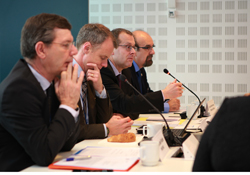WHO to embed International Health Regulations in health systems strengthening process

WHO will work towards embedding the International Health Regulations (IHR) in national health sector planning processes and health systems strengthening (HSS) to ensure a sustained, intersectoral approach to universal health coverage (UHC). This was one of the conclusions reached by experts from WHO headquarters, regional offices and country offices at a recent meeting.
Technical experts working on IHR and HSS met in Copenhagen, Denmark to discuss links and synergies between essential public health functions (EPHFs) and IHR capacities within the framework of the current WHO reform on emergencies. EPHFs and IHR underpin resilient health systems to progress the agenda for UHC in line with the Sustainable Development Goals.
As part of the WHO reform process, the WHO Executive Board adopted a resolution on EPHFs in January 2016, with follow-up discussions to take place at the Sixty-ninth session of the World Health Assembly in May 2016. WHO experts met in preparation for these discussions and reached several conclusions.
- WHO needs a unified approach on EPHFs, acknowledging the years of work done in regions and implementation at country level.
- Ensuring that IHR core capacities are in place is one key element to delivering EPHFs.
- A report should be prepared summarizing regional approaches on EPHFs and the links with IHR and HSS, along with a glossary to use as a basis for framing discussions on resilient health systems and UHC.
- A review of the ongoing activities of the HSS and IHR teams demonstrated concrete opportunities for shaping joint work in IHR, EPHFs and UHC, with immediate opportunities for work in countries on joint external evaluation assessments.
- The overall approach needs to be focused on country needs.



